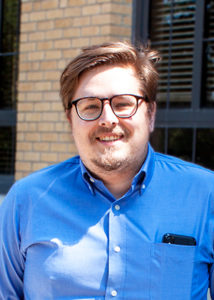The Center for Nuclear Security Science and Policy Initiatives (NSSPI) welcomes Dr. Taylor Harvey as its 2021-2022 Stanton Nuclear Security Fellow. The Stanton Nuclear Security Fellows Program supports young scholars to pursue policy-relevant technical research in nuclear security for a twelve-month period at Texas A&M University under the guidance of a faculty mentor. Fellowships are available for post-doctoral researchers and early-career faculty with the express mission of stimulating “the development of the next generation of thought leaders in nuclear security by supporting research that will advance policy-relevant understanding of the issues.”

Harvey will be working with NSSPI Director Dr. Sunil Chirayath as a postdoctoral researcher on a project to determine if a simple directional radiation detector could be a useful tool in nuclear security and nonproliferation applications. He will also work with Dr. Matthew Furhmann of the Department of Political Science on the policy implications of his research. The directional radiation detector he is investigating features a single scintillator volume and two photomultiplier tubes and could be used to provide spatial information on radiation sources over a larger area than traditional measurement technologies.
According to Harvey, these directional detectors are “a simpler and less expensive alternative to traditional imaging radiation detectors that can ‘point toward’ the direction of a radiation source without using complex electronics, distributed detector volume arrangements, or computationally taxing algorithms.”
Harvey hopes that these simple and cost-effective systems could be used to locate lost or smuggled sources, to point to widely dispersed radioactive material in post-accident or attack scenarios, to detect sources in areas that are physically difficult to access, or to monitor nuclear warheads as part of treaty verification. As such, they could provide crucial and timely information to policy makers.
Harvey earned a bachelor’s degree in Nuclear Engineering from the University of Florida in 2017. Shortly after finishing his undergraduate work, he enrolled in the Nuclear Engineering Ph.D. program at UF, where he continued working in the research group of Dr. Andreas Enqvist. He graduated with his Ph.D. in August of 2021 after writing the dissertation titled “Neutron Scatter Camera for Nuclear Safeguards Applications.” He has completed internships in nuclear non-proliferation and safeguards at Los Alamos National Laboratory in 2017 and Brookhaven National Laboratory in 2019.
The Stanton Nuclear Security Fellows program is supported by the Stanton Foundation, which was created by Frank Stanton to support work in his areas of interest, including nuclear security. Texas A&M is one of seven leading research institutions in nuclear security in the U.S. that currently host Stanton Nuclear Security Fellows.